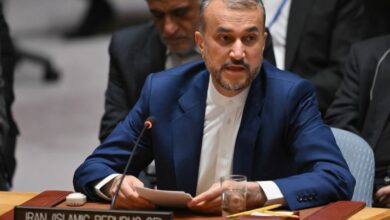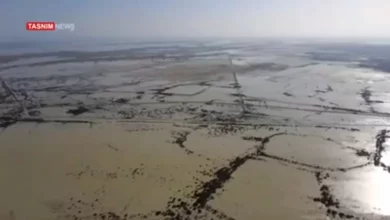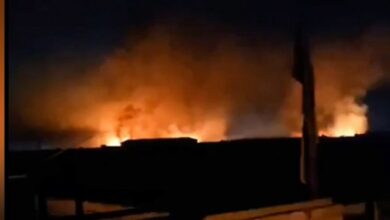While Hamas may be offering a more conciliatory tone these days, Egypt has shown no sign of softening its position toward the Islamist movement–a policy that reflects Cairo’s calculation that Western powers are increasing pressure on Hamas’ patron Iran.
Senior Hamas leader Mahmoud al-Zahar renewed last week his group’s willingness to resume Egyptian-brokered reconciliation talks with the rival Fatah movement, headed by Palestinian President Mahmoud Abbas.
"If Egypt were to guarantee implementation of what we agreed, we would be willing to sign an agreement under which new Palestinian elections could be held in June,” Zahar said in a press conference in Gaza.
Zahar’s remarks were yet another example of Hamas efforts to ease tensions with Cairo over the construction of an underground steel barrier along the Sinai-Gaza border. The wall aims to halt the smuggling of arms, but could also drastically reduce the supply of basic goods to the Hamas-controlled Gaza Strip, which has been under a strict Israeli-led blockade since Hamas took control there in June 2007.
Zahar also stressed his group’s commitment to complete an investigation into the killing of an Egyptian soldier on 6 January in clashes along the border.
Egypt, however, has stood firm in its demands that Hamas should unconditionally sign the reconciliation accord with its rival Fatah, which controls sections of the West Bank.
On Tuesday, Foreign Ministry spokesperson Hossam Zaki said he welcomed comments from Hamas leaders signaling that they are prepared to seal a unity accord with Fatah, but Zaki said Cairo’s proposal for Palestinian reconciliation was not up for negotiation.
Modifying some articles in the Egyptian-drafted document would “delay reconciliation indefinitely," Zaki said in a press statement. "Opening the way for any changes in the document would mean […] a regression."
Egypt had sponsored six in-depth sessions of intra-Palestinian dialogue. In October, Hamas stepped down suddenly from signing a reconciliation agreement on charges that the latest Egyptian offer included articles that had not been agreed on during the Cairo talks, a claim President Hosni Mubarak rejected last week as "blatant lies."
Egypt’s plan to squeeze the Islamist movement took a more serious turn when authorities detained on Saturday a senior Hamas security official as he tried to enter Gaza through the Rafah crossing border.
Egyptian media reported that Ibrahim Maarouf, the chief of police patrols in the city of Khan Younis, was arrested for attempts to illegally smuggle money into Gaza, another indicator that reflects Cairo’s strategy to choke Hamas financially.
Egypt is also considering building Arab support to pressure Hamas into more concessions.
An Arab diplomat told Al-Masry Al-Youm that Cairo has submitted a proposal to form a special Arab peacekeeping military unit to be sent to the Gaza Strip to assume the responsibility of restructuring Palestinian security forces, one of the stipulated requirements of the reconciliation agreement.
“Egypt has drafted a proposal to be presented to the next Arab summit about establishing an Arab peacekeeping mission to be deployed into Gaza,” the diplomat said, on condition of anonymity because he is not authorized to speak publicly about the proposal.
He added that the Egyptian proposal to the Arab summit, which will be held in Libya next month, suggests that Arab troops take control of the Rafah border crossing, a condition Hamas had vehemently rejected in the past.
“Egypt has long tolerated Hamas’s reluctance to end the Palestinian divide and the smuggling of goods through the Rafah underground tunnels,” said Gamal Abdel Gawad, director of Al-Ahram center for political and strategic studies. “Hamas should know now that paying lip service to Arab’s national interests while carefully securing Iran’s [national interests] is no longer acceptable.”
Recent developments indicate that Egypt’s anger with Hamas could be partially understood as retaliation against the the Palestinian movement’s procrastination on concluding the reconciliation agreement with Fatah and, to a lesser degree, in reaction to Hamas’s refusal to agree to a prisoner swap deal with Israel.
What is at stake is Egypt’s realization that the West has been growing more impatient with Iran’s continuing refusal to provide tangible guarantees that it is not pursuing a military nuclear program, a situation that would lead to either tougher economic sanctions on Tehran, or possibly an air strike against its nuclear facilities.
“Speeding up the construction of the underground steel barrier with Gaza can be comprehended within the context of Egypt’s expectations that 2010 is a decisive year in halting Iran’s nuclear program,” said Samir Ghattas, an expert on Israeli and Palestinian affairs.
“Cairo is sending a clear signal to Hamas that a proxy war must not be launched on its territories.”
US National Security Advisor James Jones warned on Saturday that Iran could respond to growing pressure over its nuclear program by lashing out at Israel through Hamas and the Lebanese group Hizbullah, which also receives support from Tehran.
“When regimes are feeling pressure, as Iran is internally and will externally in the near future, it often lashes out through its surrogates, including, in Iran’s case, Hizbullah in Lebanon and Hamas in Gaza," Jones said during a speech at a Washington-based think tank.
Jones also pointed to the prospect of further international sanctions on Iran, since the government there has rebuffed American diplomatic overtures, particularly an offer to provide Iran with economic incentives in return for its agreement to enrich the uranium outside of the country.
Israeli newspaper the Jerusalem Post reported on Sunday that US Central Intelligence Agency Director Leon Panetta had discussed the possible consequences of ratcheting up the pressure on Iran during his visits to both Israel and Egypt three days earlier.
Egypt fears that Iran could try to distract diplomatic pressure by ordering a proxy attack on Israel through its ally Hamas, a scenario that would probably ignite Israeli Operation Cast Lead II, this time with graver humanitarian effects. Over 1400 Palestinians, many of them civilians, were killed in Operation Cast Lead, the December 2008-January 2009 Israeli offensive in the Gaza Strip.
“Egyptian decision-making circles are currently debating what could be done if hundreds of thousands of Gazans flew into Egypt to escape a large-scale Israeli assault on the Strip,” said Ghattas. What the Egyptians are trying to convey to Hamas leaders, according to Ghattas, is that “acting on behalf of Iran would be extremely costly.”
In January 2008, thousands of Palestinians living in Gaza destroyed an Israeli-built Gaza-Sinai border wall and entered Egypt, a move Cairo considered a breach of its sovereignty.
Egypt, on the other hand, is now trying to push for re-launching peace talks between Israel and the Palestinian Authority, taking advantage of the fact that galvanizing Arab support for a tougher stance towards Iran would invite Israeli concessions.
In an interview with the Egyptian Police Magazine last week, President Mubarak said that the initial point of departure of the future peace negotiations should be the demarcation of borders, an important shift from previous demands that Tel Aviv halt construction of settlements first.
US Special Middle East Envoy George Mitchell suggested last year that demarcating borders, a process that could eventually involve some land exchange between Israel and the Palestinians, would automatically resolve the controversy over the expansion of settlements.
Prospects for resuming peace talks seemed more likely after President Abbas gave up conditions previously set that should Israel stop settlement construction “permanently.”
"If Israel is prepared to stop settlement building for a certain period […] talks could be restarted," Abbas told a Berlin press conference on Monday.
In the past, Abbas rejected as insufficient a limited, ten-month construction freeze ordered by Israel in November.
He did not expand on how long the period would be, though in an interview with British newspaper the Guardian on Monday, Abbas offered to begin direct talks with Israel in exchange for a complete three-month settlement freeze.
Abbas also said Israel would need to accept its June 1967 borders as the basis for any land swaps.
"These are not preconditions; they are requirements in the road map. If they are not prepared to do that, it means they don’t want a political solution," he told the newspaper.
But there might be an even faster way to jump start Palestinian-Israeli negotiations. “The US bombing of Iraq in 1991 set the stage for the Madrid peace conference later in that year," said Ghattas, "so would an air strike against Iranian nuclear facilities prepare the region for another round of peace?”




